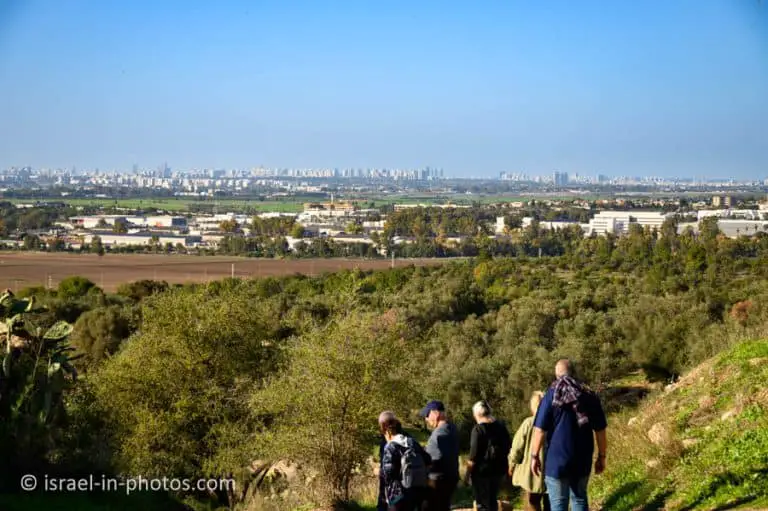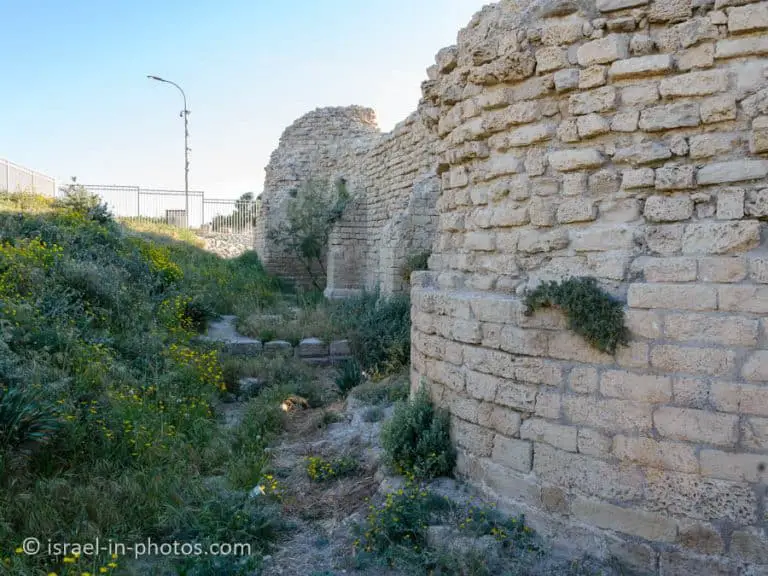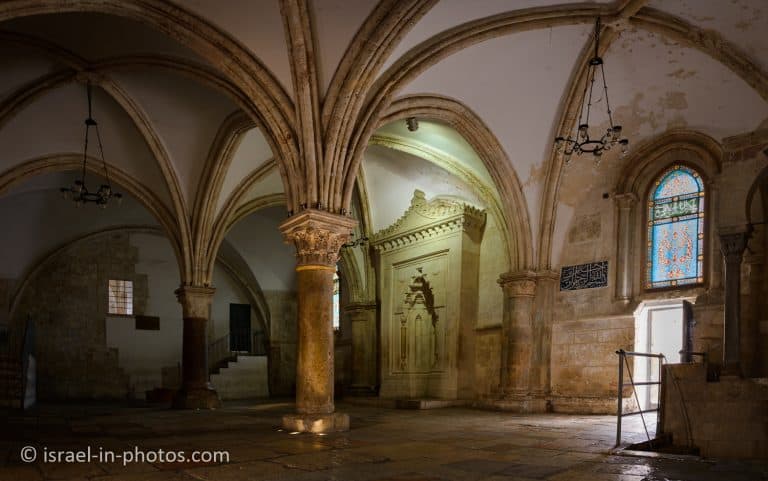Birds Mosaic, Caesarea – Visitors Guide
Birds mosaic is part of a large mansion from the Byzantine period. And I suggest combining your visit with other nearby attractions.
Note: if you are looking for information about the city of Caesarea, and not specifically this mosaic, check out my complete guide to Caesarea.
Table of Contents
Map
The mosaic is located in Caesarea, not far from Ralli Museum. And Caesarea is placed halfway between Tel Aviv and Haifa.
Directions for drivers: Link to Waze and Link to Google Maps
Directions for public transport: Link to Moovit
Interactive map of the area:
Directions and Parking
The mosaic is on top of a hill surrounded by a small pine tree park. The park is located north of the roundabout of Rothschild and Aquaduct Streets. Parking along Rothschild Street is free, and parking by Aquaduct Street costs money (blue and white curb). And if you enter “Birds Mosaic in Caesarea” into Waze, it will take you to Aquaduct Street. Therefore I suggest driving along Rothschild Street till you see this sign:
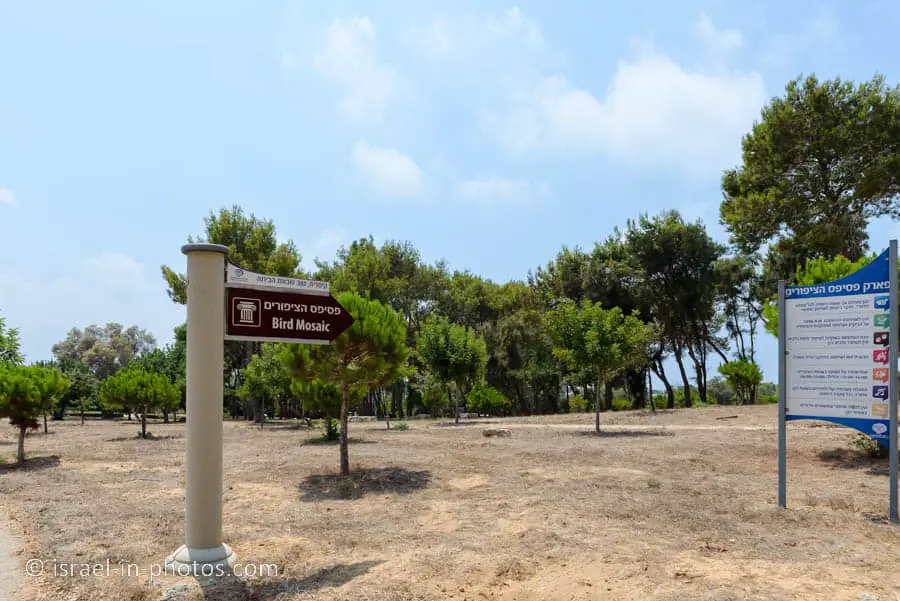
Entrance Fee
Free.
Opening Hours
Always open.
The Park
We visited the birds mosaic after our most recent visit to Ralli Museum. We parked on Rothschild Street and started walking on the trail.

As you can see from the sign, starting a fire and preparing barbeque in the park is forbidden.
The Birds Mosaic Mansion
After several minutes, we reached the top of the hill and saw the mosaic there.

The Birds Mosaic is situated in the center of a large mansion built at the end of the Byzantine period (end of the 6th century – beginning of the 7th century AD) and stands on top of a sandhill outside the Caesarea walls. Part of the mansion was excavated in 1955, it was then covered and re-exposed in 2004-2005. The mansion, likely owned by a reputable family, was built over nearly 1 acre. The complex included mosaic-paved rooms, porticos, and patios, around a central courtyard (approximately 14.5×16 m). The frame of the mosaic pavement of the central courtyard portrays animals and fruit trees. And surrounds 120 medallions arranged in 12 parallel rows, each displaying a regular sequence of 10 different birds. In each row, the sequence begins with the second image (from the north) of the row below. This way, every diagonal in the pattern from southeast to the northwest is decorated with the same bird’s image.
Fragments of mosaic floors found above the intact floor at ground level indicate that the building was originally two stories. The mansion was burned down, apparently during the Arab conquest (640 CE). The wooden girders that held up the ceiling of the ground floor collapsed in the fire, and the upper-level floorings fell on those lower levels. A unique finding was exposed under the debris – the checkered surface of a wooden ‘sygma’ table. The table fell upside-down and then burned. The table’s surface is composed of colorful glass plates, partly in the “gold-glass” technique, adorned with a relief of flowers or crosses.
Water for the residents was stored in a cistern under the central yard, into which rainwater from the roofs and patios flowed. In the northwest of the compound, a water pool was discovered that received its water from a well (the location is higher than the Caesarea aqueduct and needed an independent water supply). To date, no inscription had been found to identify the original owners, and it is named “The Birds Mosaic Mansion” after the finding that characterizes it.
The excavations and the conservation were carried out by the Antiquities Authority, with the financing of the Caesarea Edmond Benjamin de Rothschild development corporation LTD. developed and prepared the site for visitors.
Source: sign
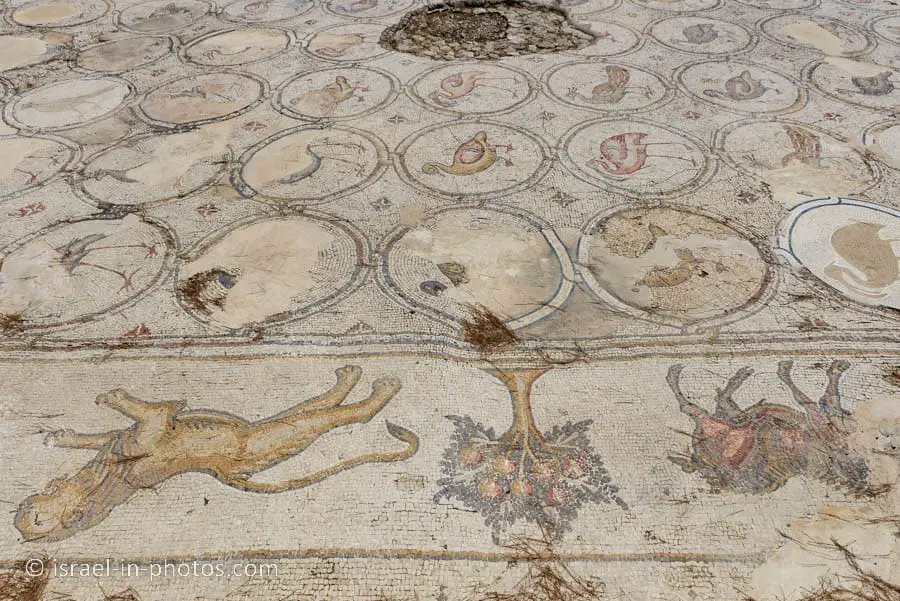

The mosaic depicts mainly birds. However, there are other animals, like elephants, deer, and lions.
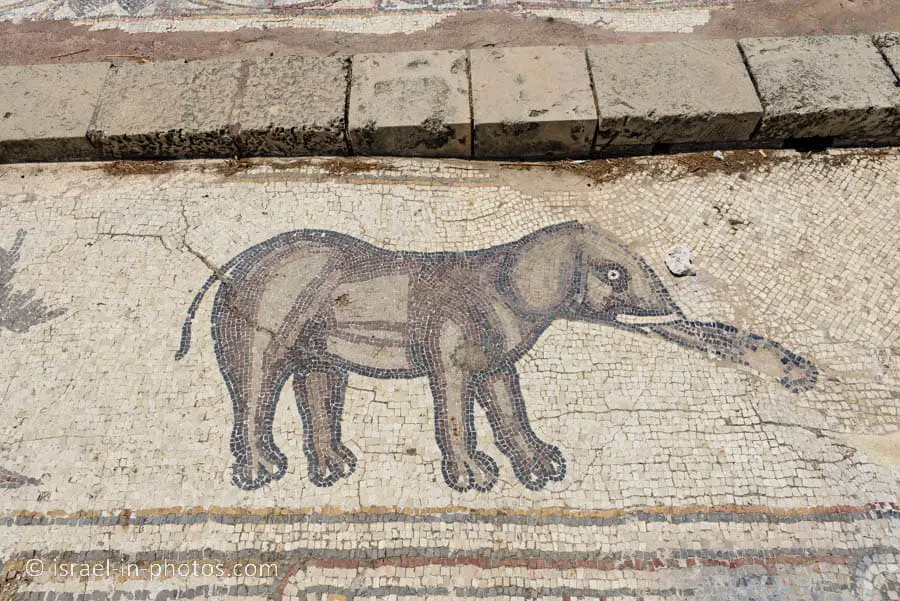
Near the western end of the mosaic, you can find a sign with explanations and a map.

The bird mosaic was a courtyard, and it is marked as #1 on the map.

When standing by the sign, you will see the sea if you turn back.

Near the courtyard mosaic, you can see other mosaics. It mainly depicts geometric figures.

Here is another photo of the mosaic:

In the photo above, you can see a yellow-orange fence. If you go in that direction, you can find some additional remains.

Hopefully, they will continue the restoration, and we will see additional parts of the mansion.
Summary
Birds Mosaic is a well-preserved stunning mosaic. But since the visit will be short, I suggest combining it with other nearby places. For example, we visited the mosaic after Ralli Museum. And then we had a picnic in the park. You can also combine it with Caesarea National Park or other places.
Moreover, check out Caesarea for additional info about the city.
Have you ever been to the Birds Mosaic? Tell us about your experience in the comments below.
That’s all for today, and I’ll see you in future travels!
Stay Tuned!
Additional Resources
Here are several resources that I created to help travelers:- Trip Planner with Attractions and Itineraries is the page that will help you create your perfect travel route.
- What is the Best Time to visit Israel? To answer this question, we will consider the weather, prices, holidays, festivals, and more.
- Information and Tips for Tourists to Israel will answer the most common questions tourists have about Israel (including safety, passports, weather, currency, tipping, electricity, and much more).
- Israel National Parks and Nature Reserves include a complete list, top ten, map, tickets (Israel Pass, Matmon, combo), and campsites.
- If you are looking for things to do, here are the pages for Jerusalem, Tel Aviv, Haifa, Sea Of Galilee, Akko (Acre), Eilat, Nazareth, Safed (Tzfat), and Makhtesh Ramon.


